Related Research Articles
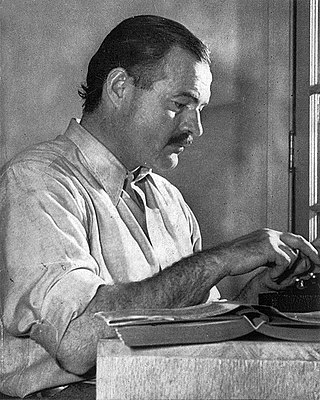
Ernest Miller Hemingway was an American novelist, short-story writer and journalist. Known for an economical, understated style that influenced later 20th-century writers, he has been romanticized for his adventurous lifestyle and outspoken, blunt public image. Some of his seven novels, six short-story collections and two non-fiction works have become classics of American literature, and he was awarded the 1954 Nobel Prize in Literature.
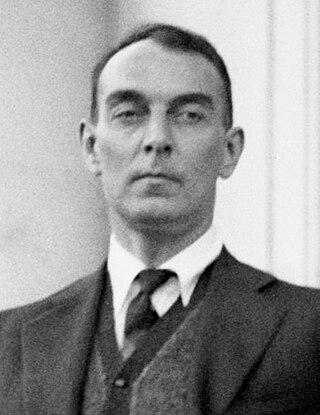
Ringgold Wilmer Lardner was an American sports columnist and short story writer best known for his satirical writings on sports, marriage, and the theatre. His contemporaries—Ernest Hemingway, Virginia Woolf, and F. Scott Fitzgerald—all professed strong admiration for his writing, and author John O'Hara directly attributed his understanding of dialogue to him.

A Farewell to Arms is a novel by American writer Ernest Hemingway, set during the Italian campaign of World War I. First published in 1929, it is a first-person account of an American, Frederic Henry, serving as a lieutenant in the ambulance corps of the Italian Army. The novel describes a love affair between the American expatriate and an English nurse, Catherine Barkley.
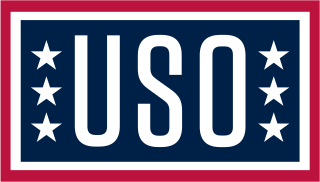
The United Service Organizations Inc. (USO) is an American nonprofit-charitable corporation that provides live entertainment, such as comedians, actors and musicians, social facilities, and other programs to members of the United States Armed Forces and their families. Since 1941, it has worked in partnership with the Department of War, and later with the Department of Defense (DoD), relying heavily on private contributions and on funds, goods, and services from various corporate and individual donors. Although it is congressionally chartered, it is not a government agency.

William Maxwell Evarts "Max" Perkins was an American book editor, best remembered for discovering authors Ernest Hemingway, F. Scott Fitzgerald, Marjorie Kinnan Rawlings, and Thomas Wolfe.
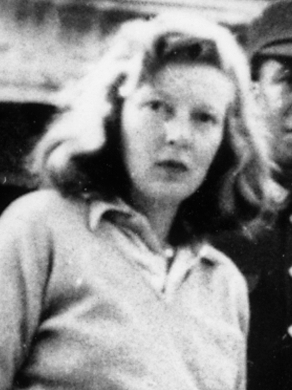
Martha Ellis Gellhorn was an American novelist, travel writer, and journalist who is considered one of the great war correspondents of the 20th century. She reported on virtually every major world conflict that took place during her 60-year career.

Agnes Mary Frances Robinson was an Anglo-French poet, novelist, essayist, literary critic, and translator. She was the elder sister of the novelist and critic Frances Mabel Robinson.
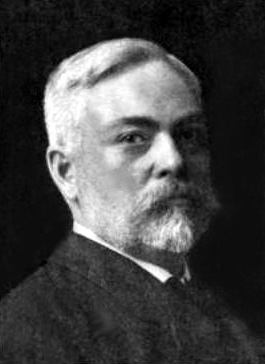
William Holabird was an American architect.
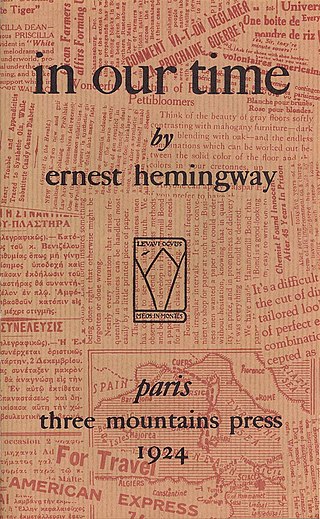
In Our Time is the title of Ernest Hemingway's first collection of short stories, published in 1925 by Boni & Liveright, New York, and of a collection of vignettes published in 1924 in France titled in our time. Its title is derived from the English Book of Common Prayer, "Give peace in our time, O Lord".

Across the River and Into the Trees is a novel by American writer Ernest Hemingway, published by Charles Scribner's Sons in 1950, after first being serialized in Cosmopolitan magazine earlier that year. The title is derived from the last words of Confederate States Army General Thomas J. "Stonewall" Jackson, who was mortally wounded by friendly fire during the American Civil War: “Let us cross over the river and rest under the shade of the trees.” In the 19th century, this was understood to refer to the Jordan River and the passage to death and afterlife in Christianity.
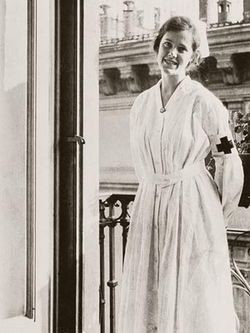
Agnes Hannah von Kurowsky Stanfield was an American nurse who inspired the character "Catherine Barkley" in Ernest Hemingway's 1929 novel A Farewell to Arms.

One of Ours is a 1922 novel by Willa Cather that won the 1923 Pulitzer Prize for the Novel. It tells the story of the life of Claude Wheeler, a Nebraska native in the first decades of the 20th century. The son of a successful farmer and an intensely pious mother, he is guaranteed a comfortable livelihood. Nevertheless, Wheeler views himself as a victim of his father's success and his own inexplicable malaise.

In Love and War is a 1996 romantic drama film based on the book, Hemingway in Love and War by Henry S. Villard and James Nagel. The film stars Sandra Bullock, Chris O'Donnell, Mackenzie Astin, and Margot Steinberg. Its action takes place during the First World War and is based on the wartime experiences of the writer Ernest Hemingway. It was directed by Richard Attenborough. The film was entered into the 47th Berlin International Film Festival.
"A Dear John Letter", or "Dear John" is a popular country music song written by Billy Barton, Fuzzy Owen and Lewis Talley. It was popularized by Ferlin Husky and Jean Shepard, and was a crossover country-pop hit in 1953.

Ernest Hemingway (1899–1961) was an American novelist, short-story writer, journalist, and sportsman. His economical and understated style—which he termed the iceberg theory—had a strong influence on 20th-century fiction. Many of his works are considered classics of American literature.
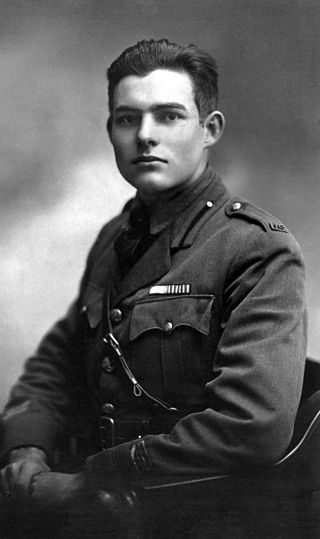
"A Very Short Story" is a short story written by Ernest Hemingway. It was first published as a vignette, or chapter, in the 1924 Paris edition titled In Our Time, and later rewritten and added to Hemingway's first American short story collection In Our Time, published by Boni & Liveright in 1925.
Henry Serrano Villard was an American foreign service officer, ambassador and author. He served as United States Ambassador to Senegal and Mauritania from 1960-1961.

"The Revolutionist" is an Ernest Hemingway short story published in his first American volume of stories In Our Time. Originally written as a vignette for his earlier Paris edition of the collection, titled in our time, he rewrote and expanded the piece for the 1925 American edition published by Boni & Liveright. It is only one of two vignettes rewritten as short stories for the American edition.

Samuel Beckley Holabird was a career officer in the United States Army. A Union Army veteran of the American Civil War, Holabird attained the rank of brigadier general and is most notable for his service as the Army's Quartermaster General, a position he held from 1883 to 1890.

The League of Wives of American Vietnam Prisoners of War was an organization founded in 1967 initially intended for sharing information and support among the wives of POW and MIA soldiers during the Vietnam War. The league was founded by Sybil Stockdale, the wife of detained American soldier James (Jim) Stockdale. Although its initial aim of the league was to provide support for its members, the league's wives were inspired to take action to ensure the safe return of POW and MIA Americans in Vietnam after being left discontented by the US military when it could not effectively provide families with the statuses or conditions of their relatives. The letters sent and meetings held by the league with military officials throughout the latter half of the Vietnam War attracted some animosity and significant media attention.
References
- ↑ "Popular Baby Names". www.ssa.gov. Retrieved 2021-07-12.
- ↑ "Agnes von Kurowsky to Ernest Hemingway". World Wide Words. 7 March 1919. Retrieved 21 September 2023.
- 1 2 Quinion, Michael (13 Dec 2003). "Dear John letter". World Wide Words. Retrieved 7 January 2014.
- ↑ Hollywood Girls Gain Weight on Tour of Africa St. Petersburg Times, March 21, 1944.
- ↑ Gross, Chuck (2006). Rattler One-Seven: A Vietnam Helicopter Pilot's War Story. University of North Texas Press. p. 173. ISBN 9781574412215.